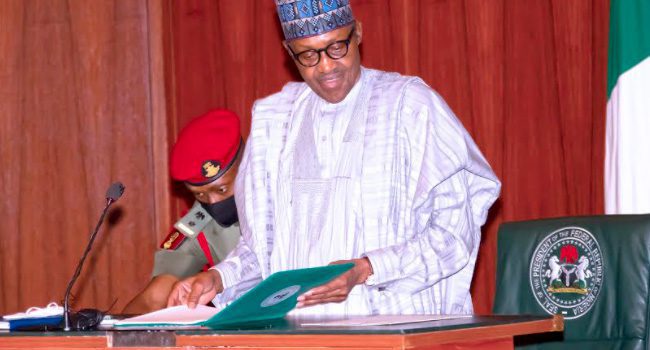Nigerian President Muhammadu Buhari has launched the country’s “The Decade of Gas in Nigeria” on Monday in Abuja, which is aimed at transforming Nigeria into an industralised nation with the help of the gas sector.
Speaking at the virtual launch of the project, Buhari said that his administration would fully utilise the enormous gas resources in the country to uplift the economy and drive industralisation.
He stated that before the declaration of the Year 2020 as The Year of Gas, “this Administration had shown commitment to the development of Nigeria’s vast gas resources and strengthening of the gas value chain by reviewing and gazetting policies and regulations to enhance operations in the sector as encapsulated in the National Gas Policy of 2017.”
‘‘Our major objective for the gas sector is to transform Nigeria into an industrialized nation with gas playing a major role and we demonstrated this through enhanced accelerated gas revolution,’’ he said.
According to the Nigerian leader, given the country’s potential of about 600 trillion cubic feet of gas, the commodity has the enormous potential to diversify the Nigerian economy.
‘‘The rising global demand for cleaner energy sources has offered Nigeria an opportunity to exploit gas resources for the good of the country. We intend to seize this opportunity,’’ he said.
Local media reports quoted Buhari as saying to the participants at the virtual Nigeria International Petroleum Summit (NIPS) 2021 Pre-Summit Conference and the official launch of the Decade of Gas that his administration has prioritized gas development and recorded remarkable progress, it is well known that Nigeria is a gas nation with little oil, but the country has focused on oil over the years.
‘‘That is the paradox that this Administration decided to confront when we declared the year 2020 as “The Year of Gas” in Nigeria.
‘‘It was a bold statement to demonstrate the resolve of this Administration that gas development and utilization should be a national priority to stimulate economic growth, further improve Nigeria’s energy mix, drive investments, and provide the much-needed jobs for our citizens in the country,” he said.
He gave some of the administration’s projects to energise the sector to include the development of gas infrastructure along with the domestic utilization of cooking gas and as well as the process of commercializing gas flares, development of industrial and transport gas markets, and increasing gas to power.
‘‘We also kick-started other policies and projects like the National Gas Expansion Programme, Autogas policy, and the construction of the 614km Ajaokuta-Kaduna-Kano gas pipeline.
‘‘After a thorough review of these laudable achievements and successes in the gas space, we acknowledge that Nigeria still has more work to do in the gas space.
‘‘This has led the Federal Government to begin a more proactive push towards gas development. This initiative will ensure further optimal exploitation and utilization of the country’s vast gas resources,” he added.
GIK/APA


